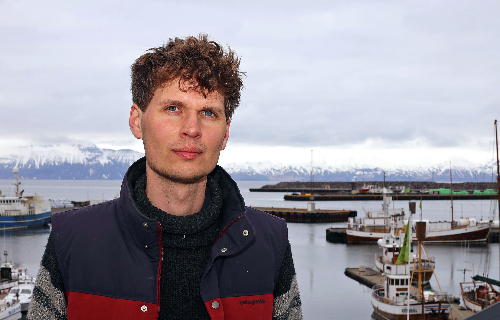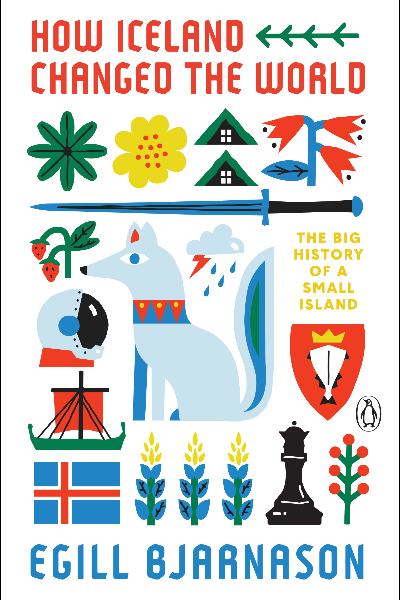There’s nothing Egill Bjarnason enjoys more than a good story. Like the October day in 1975 when 90 percent of the women in his native country of Iceland decided to take the day off.
Flights were cancelled, classrooms sat empty, and bankers found themselves answering phones as women gathered in downtown Reykjavik to protest the fact they were paid less and didn’t get the same opportunities as men. One woman, anthropologist Sigridur Duna, a child at the time, recalled how the smell of burning meat filled her neighborhood as men attempted to cook, with catastrophic results.
That 24 hours of ringing phones and spoiled dinners would, however, reverberate around the world, as UC Santa Cruz alum Bjarnason writes in his 2021 book, How Iceland Changed the World: The Big History of a Small Island. Five years later, Iceland would elect former theater director Vigdis Finnbogadottir as president, the world’s first democratically elected female head of state, and set the stage for Iceland to become a global role model in gender-equality policy.
That story is just one in Bjarnason’s 288-page tome, which the New York Times called “a joyously peculiar book” that explains exactly how one tiny island has influenced the world. Published by Penguin, the book reflects Bjarnason’s time at UC Santa Cruz where he earned a master’s degree in social documentation in 2015. His stories are quirky and inspiring, often told through the eyes of everyday Icelanders, an independent, risk-taking, confident people who didn’t have a word for nepotism until 1995 since almost everyone is more or less related and that’s just how things worked.
There’s the story of the open scorn the feisty Icelanders had for the Nazis who came to explore the island and how the tiny nation helped prevent Germany from winning the Battle of the Atlantic. Another tale documents the role Iceland played in birthing the country of Israel when the island’s freshly minted ambassador to the U.N. did what any good Icelander would do and took a job nobody else wanted because Icelanders don’t duck responsibility. He ended up heading a U.N. ad hoc committee tasked with deciding what to do with Palestine and delivered a rousing speech urging the international body to vote for a two-state solution, according to Bjarnason.
“I think one of the basic principles of Soc Doc [the Social Documentation program at UC Santa Cruz] is about giving voice to people being left out of the local, national, and global conversations,” said B. Ruby Rich, emerita professor of film and digital media at UC Santa Cruz, “and finding a way to let those voices be communicated and recognized. … I think he [Bjarnason] may very well have used the Soc Doc idea that you can change the lens and see a different version of history and geography” for his book.
Bjarnason, now a freelance journalist for media companies from the New York Times to the Associated Press, agreed.
Speaking by phone from his home in the northern beach town of Husavik, Iceland, he said, “I always liked the Soc Doc idea that you can initiate change with stories and that stories are the best way to move things forward; to get people to look at an issue and mobilize change.”
Bjarnason’s career as a storyteller began when he was still a teenager. At 18, he quit school and headed to Palestine to explore and document life there. With the wry sense of humor that permeates his book, Bjarnason explained how, in a country of only 360,000 people, Icelanders tend to be filled with self-importance, which breeds confidence and also risk-taking. So, a failure, like dropping out of school, is easily forgiven in that country.
“The way the school system is set up in Iceland, it incentivizes dropouts,” Bjarnason, 33, said with a sparkle in his voice. “I totally blame the school system.”
After Palestine, he got a bachelor’s degree in political science, worked as a journalist, and then came to UC Santa Cruz as a Fulbright Scholar. At UC Santa Cruz, he said, he not only mastered technical skills but also learned the importance of planning, commitment, and being nimble. His thesis film, Once the Ice Melts, for example, started out as a film about mining and ended up as an exploration of what happens when globalization and climate change meet an Indigenous community in Greenland.
His book was born after he returned to Iceland and began working as a freelance journalist. The Associated Press, he said, approached him about researching and penning a series of pre-written obituaries for influential Icelanders. The AP keeps an archive of obituaries for famous people that can be quickly sent out to other media when someone dies.
“And that got me thinking about the theme of my book: how Iceland has made an impact on world history,” Bjarnason said.
He spent eight years researching and writing the book, creating a narrative that is both approachable and view-changing.
Now working on a proposal for another book project and penning articles for news organizations, Bjarnason believes Iceland’s next appearance on the world stage will be centered on environmental solutions to climate change.
“Iceland is making an impact on being greener and finding green solutions,” he said. “I think that’s going to be my theme for the next couple of years."




